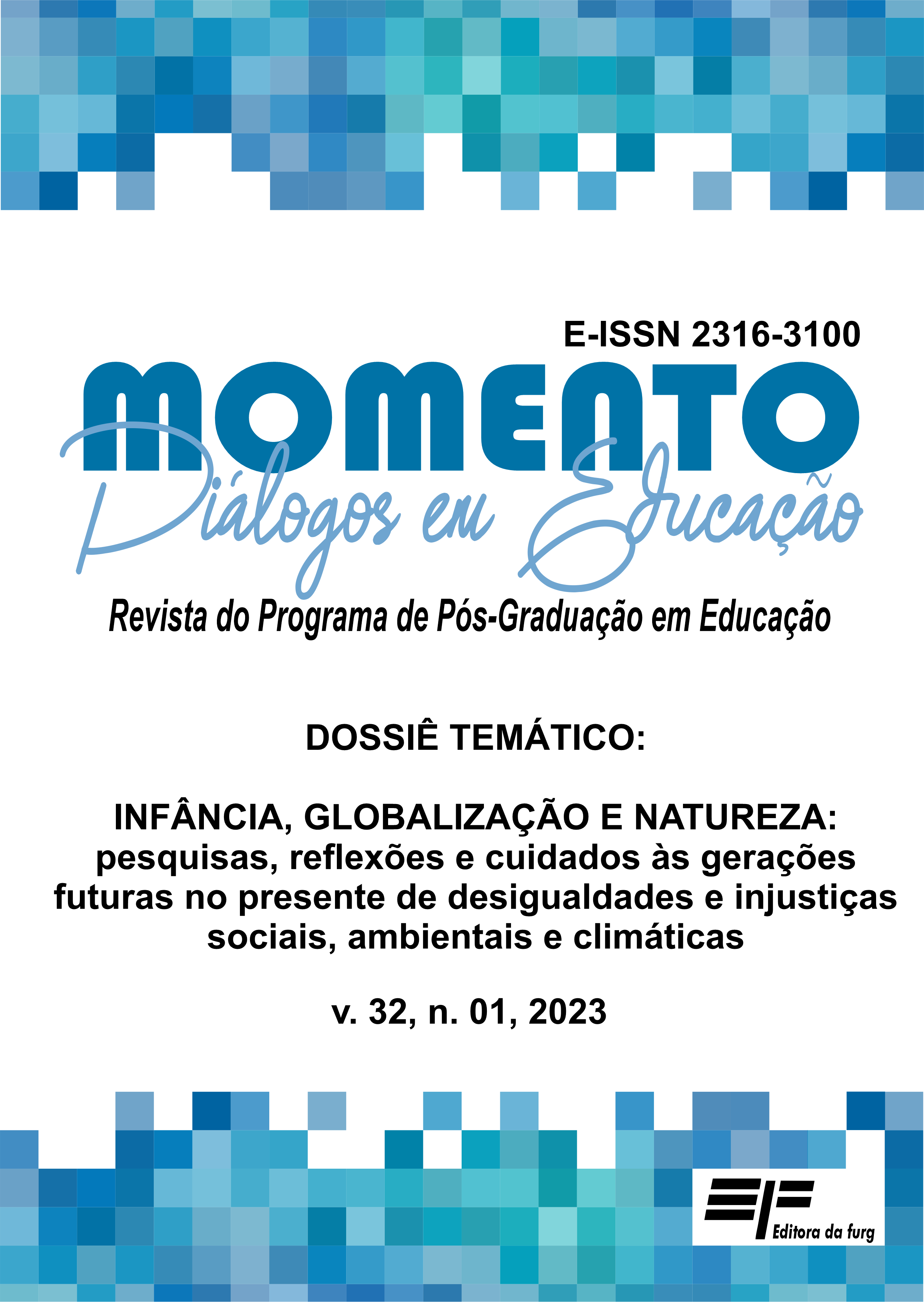AS CRIANÇAS E O VENTO
incursões no mundo da fantasia em prol do ambiente
DOI:
https://doi.org/10.14295/momento.v32i01.15026Keywords:
Criança. Natureza. Brincar. Ludicidade. AmbienteAbstract
According to Henry Thoreau - Walden or Life in the Woods - we can only understand nature when we walk it and are an integral part of it, as nothing compares to the feeling of freedom that a walk in the open air through the woods can bring to the walker. It is delicious when the whole body is one sense and imbibes delight through every pore (Thoreau, 1999:149). This strange freedom creates an affinity with the fluttering leaves, which take your breath away, especially when the wind blows and roars. A sort of sentry of the earth that lifts the leaves and sends out warnings: warns the rabbit to flee from the fox and alerts children to speed and lightness, encouraging them to run after the leaves and play with them all over the place. Space, fundamental for humans, in general, and children, in particular, is an indicator of possibilities. When you don't have forests, are you not allowed to travel? Only imagine?
In this text and based on a reflection on the ways of playing outdoors, we suggest that the reader experiment thinking about the feeling of a child that doesn't run in the wind, doesn't feel it on the face, doesn't pick up leaves, doesn't play with animals, but still has to build stories. A child who does not play outside but instead breathes the saturated air of a closed classroom full of people, where the wind does not circulate except in the winter brought by storms. We also reflect on the institutionalization of childhood and the spaces and times we accustom children. Throughout the narrative, which stems from our work with children and the adults who work with them, we remember the need to relocate the theme of nature from school, to think of nature parting from play and of playing that allows environmental awareness and of different ecosystems.
Downloads
References
Almeida, A. (2009). Para uma sociologia da infância. Lisboa: ICS.
Ariès, P. (1988). A criança e a vida familiar no antigo regime. Lisboa: Relógio D'Água
Araújo, M.J & Monteiro H.(2020). “Para uma definição de tempo livre tendo as crianças por medida e referente. O que diz a língua dos pássaros?” (2020), Sociologia: Revista da Faculdade de Letras da Universidade do Porto, Número Temático – Direitos das Crianças: abordagens críticas a partir das ciências Sociais Boysen, G. A. (2015a). Preventing the overinterpretation of small mean differences in student evaluations of teaching: An evaluation of warning effectiveness. Scholarship of Teaching and Learning in Psychology, 1(4), 269–282. https://doi.org/10.1037/stl0000042
Araújo, M.J. (2011). Tempos de criança e tempos de aluno: estudo sobre a relação entre o tempo livre e o tempo de trabalho escolar em espaços educativos frequentados por crianças entre os 6 e os 12 anos de idade. Tese de doutoramento apresentada na FPCE-UP.
Becchi, E. & Dominique, J. (1998). Histoire de l'Enfance en Occident. Paris: Editions du Seuil.
Berger, J. (2020). Porquê Olhar os Animais. Lisboa: Antígona.
Chawla, L.; Cushing, D.; Malini, L.; Pevec, I.; van Vliet, W.; & Zuniga, K.(2012). Children and the environment. Oxford University Press, 1-33.
Clark, A. & Gallacher, L. (2013). Children in and out of place. In Childhoods in Context. 3-21 Bristol: Policy Press.
Dewey, J. [1959 (2007) ]. Democracia e Educação. Lisboa: Didática Editora
Eagleton, T. (2021). Porque é que Marx tinha razão. Lisboa: Edições 70.
Ferreira, J. G. (2013). Aventuras de João Sem Medo. Lisboa: D. Quixote.
Freire, P. (1967). Educação como Prática de Liberdade. Rio de Janeiro:Paz e Terra
Freinet, E. (1969). Nascimento de uma pedagogia popular. Lisboa: Editorial Estampa.
Lopes, S. & Araújo, M.J. (2021). Para quem não sabe educar até as crianças atrapalham. In Araújo, M.J; Monteiro, H. & Araújo, M. (2021) Vermelho Vivo. Participação em Tempos de Eleição Autárquica. VNG: Furar o Cerco.
Louv, R. (2008). The last child in the woods. Disconnection between children and the natural world. USA: Algonquin Books.
Ribeiro, A.(1991). A Escola Pode Esperar. Porto: Edições Asa.
Rémy, J. & Voyé,L. (1997). A Cidade: Rumo a uma nova definição. Porto: Edições Afrontamento
Rodari, G. (2019). Gramática da Fantasia. Lisboa: Faktoria K.
Rosas, L. & Guimarães, R. (2018). Leitura Furiosa. Lisboa: Outro Modo.
Sarmento, M.J. (2006). “Les Cultures de l’enfance au carrefour de la seconde modernité”, in Régine Sirota Éléments pour une sociologie de l’enfance. Rennes: PUR, 307-316.
Sirota, R. (2006). Éléments pour une sociologie de l’enfance. Rennes: PUR.
Stoer, Stephen R. (1988) Sociologia da Educação e Formação de Professores. Cadernos de Ciências Sociais, n.6 (75-89.).
Susskind, D. (2020).Um Mundo sem Trabalho. Porto: Porto Editora (Ideias de Ler)
Thoreau, H. (1999). Walden ou a Vida nos Bosques. Lisboa: Antígona
Tonkiss, F. (2005). Space, The City and Social Theory: social relations and urban forms. Cambridge: Polity Press
Downloads
Published
How to Cite
Issue
Section
License
Copyright (c) 2023 Momento - Diálogos em Educação

This work is licensed under a Creative Commons Attribution 4.0 International License.
À Revista Momento − Diálogos em Educação, ficam reservados os direitos autorais, de todos os artigos nela publicados.


